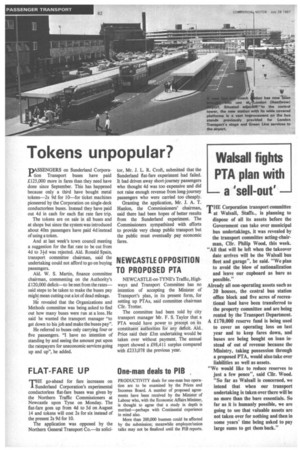Tokens unpopular?
Page 64

If you've noticed an error in this article please click here to report it so we can fix it.
DASSENGERS on Sunderland Corpora tion Transport buses have paid £125,000 more in fares than they need have done since September. This has happened because only a third have bought metal tokens-2s 9d for 10—for ticket machines pioneered by the Corporation on single-deck conductorless buses. Instead they have paid out 4d in cash for each flat rate fare trip.
The tokens are on sale in all buses and at shops but since the system was introduced about 40m passengers have paid 4d instead of using a token.
And at last week's town council meeting a suggestion for the flat rate to be cut from 4d to 31d was rejected. Aid. Ronald Spain, transport committee chairman, said the undertaking could not afford to go on buying passengers.
Aid. W. S. Martin, finance committee chairman, commenting on the Authority's £120,000 deficit—to be met from the rates— said steps to be taken to make the buses pay might mean cutting out a lot or dead mileage.
He revealed that the Organizations and Methods committee was being asked to find out how many buses were run at a loss. He said he wanted the transport manager "to get down to his job and make the buses pay".
He referred to buses only carrying four or five passengers. "I have no intention of standing by and seeing the amount put upon the ratepayers for uneconomic services going up and up", he added. tor, Mr. J. L. R. Croft, submitted that the Sunderland flat-fare experiment had failed. It had driven away short-journey passengers who thought 4d was too expensive and did not raise enough revenue from long-journey passengers who were carried too cheaply.
Granting the application, Mr. J. A. T. Hanlon, the Commissioners' chairman, said there had been hopes of better results from the Sunderland experiment. The Commissioners sympathized with efforts to provide very cheap public transport but the public must eventually pay economic fares.




































































































































































